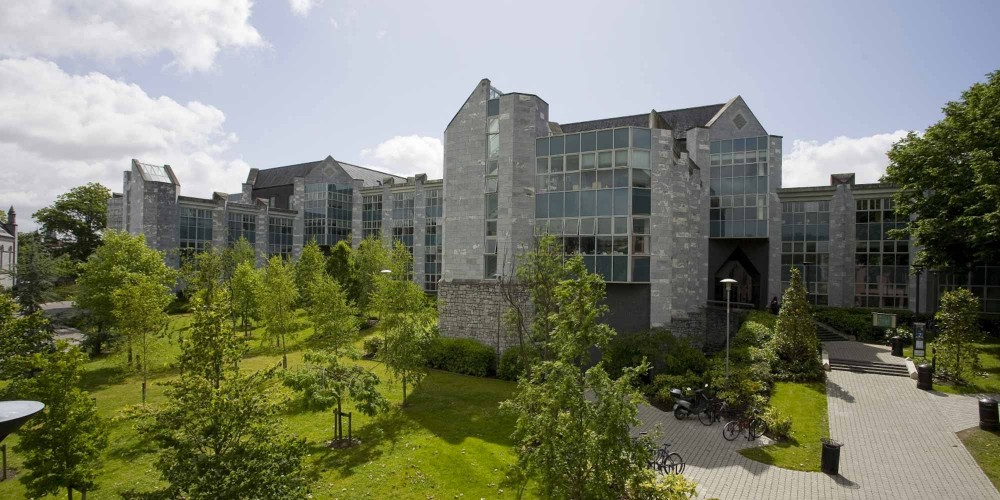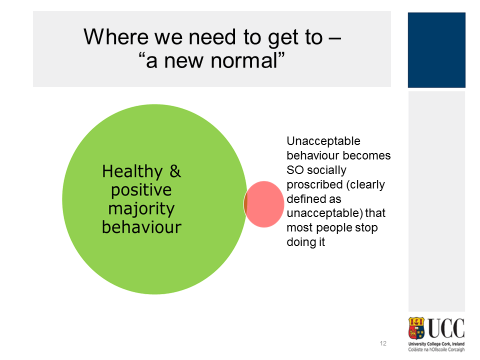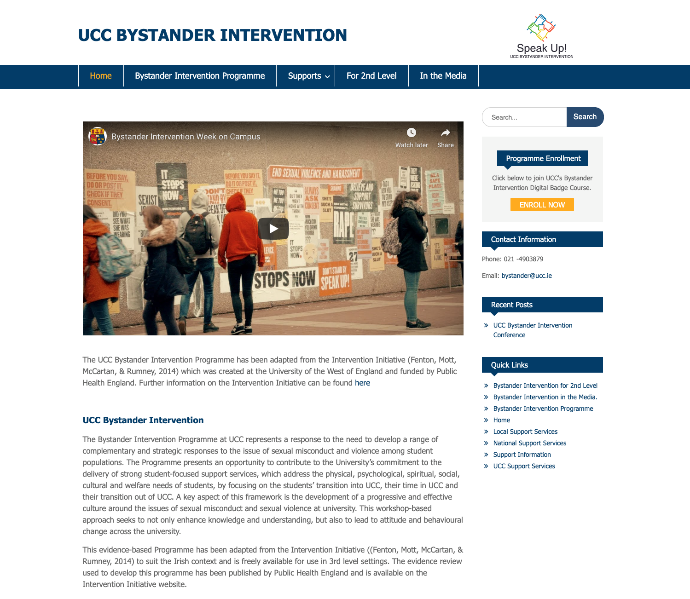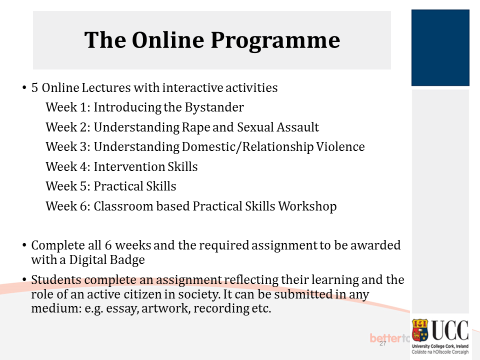
Find information on how to make a Protected Disclosure under the external procedures in place in the HEA.

University College Cork strives to ensure a safe and welcoming campus for new and existing staff and students through effective, transparent and accountable practices and policies. In tackling the issue of sexual assault and rape, the university has recognised the capacity for the bystander intervention module to not only provide a mechanism to educate students on the law and practice governing safe, lawful sexual relations; but also to cultivate a campus culture of zero tolerance of all forms of unacceptable behaviour and empower students to actively contribute to a safe, supportive environment. Specifically, by developing students’ capacity to effect change through pro-social behaviour and attitudes, the module contributes to the University’s commitment to the delivery of strong student-focused support services, which address the physical, psychological, spiritual, social, cultural and welfare needs of students.
Led by Dr Louise Crowley in the School of Law, the introduction of the Bystander Intervention programme at UCC is a targeted response to the issue of sexual respect and broader consent awareness on the university campus. It is an evidence-based programme, devised and adapted from the UK Intervention Initiative (Dr Rachel Fenton), to educate and empower students to effect change in the context of sexual harassment and violence. In identifying the unique position of the University to empower students to better understand the dangers of the normalization of sexual harassment caused by intervention inhibition, we devised and piloted this programme to upskill students and shatter any false consensus that such behaviour is acceptable. In cultivating a shared recognition of a collective capacity to mandate a new normal, UCC can become a safer campus for all. To position the students to recognise unacceptable behaviour, the programme addresses key issues of consent and unlawful behaviour whilst empowering students to make safe and effective interventions.


Following a successful 2-year pilot of in-class workshops with first year UCC Law, and Nursing and Midwifery students, which demonstrated significant impact and behavioural change, we transitioned the programme to a blended learning delivery, now available to all 22,000 students on campus. This ensured the sustainability of the programme and makes it accessible to all students irrespective of their location or timetable obligations. In delivering the material to the students in their capacity as bystanders, the UCC module presents a positive and inclusive approach to the capacity to reject sexual violence. By cultivating a shared understanding of the unacceptability of unwanted advances, inappropriate comments, threatening behaviour, sexual harassment and violence, participants are educated to recognise the unacceptability of such actions. The second aspect of the bystander intervention approach is to introduce them to the actions required to effect behavioural change, involving the development and practising of the necessary skills of intervention.


As a targeted initiative capable of effecting cultural change, the UCC Bystander Intervention initiative has been expressly identified in the National Framework as the sector leader, now being rolled out in Higher Educational institutions nationally, at the request of, and funded by, the Minister for Higher Education. The replicability of the programme has been made simple, through the creation of a common e-cartridge which allows for the transfer of our online elements directly to each institution. Additionally, the in-class tool kit, presentations and facilitator notes are shared, and training and support for other HEIs is provided. Requests to introduce the UCC Bystander Intervention programme have been received from the THEA and the USI, as well as directly from the following institutions; UCD, UL, TCD, CIT, LIT, ITT, Maynooth University, DKIT, GMIT, IADT and DCU. Site visits and dissemination are ongoing.
Impact Of Bystander Intervention And Related Events On Campus – Testimonies Of Students
“This is a fantastically organised module… The inclusion of this module as an essential module for all 1st year students is a fantastic way for UCC to make a stand on an enormous global societal issue.”
“I have a lot more confidence being able to speak and voice my opinions after taking part in the class.”
“Bystander Intervention has helped me to understand the kind of behaviour, and the boundaries which people cross in day to day life, that amount to sexual misconduct, and the ways it is safe to intervene.
“I really do hope that this goes mainstream, valuable life lessons, students deserve to learn these skills…”
“I can’t stress enough how important it is that more students get to participate in this workshop. I didn’t actually realise I was personally affected by the material, but it meant that I could go and talk about it.”

